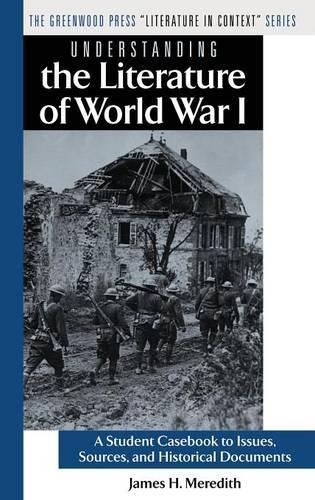
Understanding the Literature of World War I: A Student Casebook to Issues, Sources, and Historical Documents
(Hardback)
Available Formats
Publishing Details
Understanding the Literature of World War I: A Student Casebook to Issues, Sources, and Historical Documents
By (Author) James H. Meredith
Bloomsbury Publishing PLC
Greenwood Press
30th December 2004
United States
Classifications
General
Non Fiction
810.9358
Physical Properties
Hardback
208
Description
Much can be learned about both the historic and human impact of war by studying the literary output associated with the period during and immediately after the event. This casebook helps students build bridges between WWI history and the fictional accounts provided by such works as All Quiet on the Western Front, A Farewell to Arms, and A Son at the Front. For each work, insightful analysis and historical context is provided. This unique casebook approach adds another layer of understanding for readers by relating the fiction to primary documents from the war years, including treaties, speeches, military reports, original propaganda, and personal journal accounts from soldiers on both sides of the conflict. Readers are exposed to a diversity of perspectives from the military leadership, diplomacy, soldiers in battle and families on the home front. A chronology helps readers situate the significant events described within the historic timeframe. This casebook is organized around five specific issues and themes that recur in the literature: 'War at the Front' explores actual military combat, 'Women and the Homefront' reveals the impact of tragic loss on families, and 'War Poetry' confronts the anti-war sentiment, expressed by poets such as Rupert Brooke, Siegfried Sassoon, and Wilfred Owen. 'Strategic Technology of Modern War' looks at the impact of progaganda and civilian bombing. A final chapter examines the aftermath of war with analysis of fictional works such as Tender is the Night and Mrs. Dalloway. Each chapter concludes with questions for classroom discussions and assignments as well as suggested further readings.
Reviews
Understanding the Literature of World War I joins others in the 'Literature in Context' series to present high school to college level students with a 'casebook' to issues, sources and historical documents. Students may use this to understand both World War II history and the fiction works which resulted in such classics as All Quiet On the Western Front, making it of dual importance to both American history and literature classes.-Internet Bookwatch
"Understanding the Literature of World War I joins others in the 'Literature in Context' series to present high school to college level students with a 'casebook' to issues, sources and historical documents. Students may use this to understand both World War II history and the fiction works which resulted in such classics as All Quiet On the Western Front, making it of dual importance to both American history and literature classes."-Internet Bookwatch
Author Bio
JAMES H. MEREDITH is a former Lieutenant Colonel and professor of English at the United States Air Force Academy. He has served on several Literary Society boards, and is frequently writes on such literary figures as Fitzgerald, Hemingway, Stephen Crane, Joseph Heller. He also writes on such historic figures and topics as Theodore Roosevelt, the American Civil War, and World War II. He is the author of Understanding the Literature of World War II (Greenwood, 1999).
